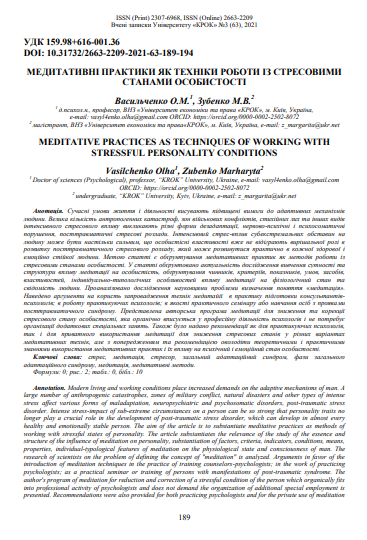MEDITATIVE PRACTICES AS TECHNIQUES OF WORKING WITH STRESSFUL PERSONALITY CONDITIONS
DOI:
https://doi.org/10.31732/2663-2209-2021-63-189-194Keywords:
stress, meditation, stressor, general adaptation syndrome, phases of general adaptation syndrome, meditative methodsAbstract
Modern living and working conditions place increased demands on the adaptive mechanisms of man. A large number of anthropogenic catastrophes, zones of military conflict, natural disasters and other types of intense stress affect various forms of maladaptation, neuropsychiatric and psychosomatic disorders, post-traumatic stress disorder. Intense stress-impact of sub-extreme circumstances on a person can be so strong that personality traits no longer play a crucial role in the development of post-traumatic stress disorder, which can develop in almost every healthy and emotionally stable person. The aim of the article is to substantiate meditative practices as methods of working with stressful states of personality. The article substantiates the relevance of the study of the essence and structure of the influence of meditation on personality, substantiation of factors, criteria, indicators, conditions, means, properties, individual-typological features of meditation on the physiological state and consciousness of man. The research of scientists on the problem of defining the concept of "meditation" is analyzed. Arguments in favor of the introduction of meditation techniques in the practice of training counselors-psychologists; in the work of practicing psychologists; as a practical seminar or training of persons with manifestations of post-traumatic syndrome. The author's program of meditation for reduction and correction of a stressful condition of the person which organically fits into professional activity of psychologists and does not demand the organization of additional special employment is presented. Recommendations were also provided for both practicing psychologists and for the private use of meditation to reduce stress in various versions of meditation techniques, but with warning and recommendation to master the theoretical and practical knowledge of the use of meditative practices and their impact on mental and emotional state.
Downloads
References
Васильев В. П. Религии Востока: конфуцианство, буддизм и даосизм. СПб, 1873. 183с.; М.: Ленанд, 2015. 192с.; М.: Едиториал УРСС, 2018. 192 с.
Зубенко М. В., Васильченко О. В. Медитативні практики як психофізіологічний, етнокультурний та психотерапевтичний феномен. Держава, регіони, підприємництво: інформаційні, суспільно-правові, соціально-економічні аспекти розвитку: матеріали ІІ Міжнародної конференції (20 листопада 2020 р.). Частина 2. Київ : ВНЗ «Університет економіки та права «КРОК», 2020. С. 153-154.
Мандель Б.Р. Психология стресса. Учебное пособие. Москва : ФЛИНТА, 2014. 252 с.
Настольная книга практического психолога / Сост. С. Т. Посохова, С. Л. Соловьева. Москва : АСТ: Хранитель; СПб.: Сова, 2008. 671 с. (с. 141-157).
Суарес Ф. Метафизические рассуждения. Введение и 1 раздел. Рассуждения. Историко-философский ежегодник. 1987. С. 218– 242.
Ellerton PhD, CMC, Roger. Live Your Dreams Let Reality Catch Up: NLP and Common Sense for Coaches, Managers And You. Ottawa, 2005. Canada: Trafford Publishing.
The official site of Psychology (2021), retrieved from : http://psychology.net.ru/
The official site of Psy-yoga.ru (2021), retrieved from : http://psy-yoga.ru/articles/praktika-meditacii-istoriya-i-sovremennost.
Lazarus with Folkman. Stress, appraisal, andcoping, 1984, New York: SpringerPub.
What Are You Hungry For?. New York: Harmony Books. 2013.



